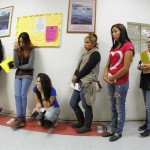‘Civil Gideon’ Suggested For Pennsylvania
Most of us know that we have a right to an attorney if we’re arrested, but a movement is afoot to provide a similar provision for those facing civil lawsuits. In particular, cases involving “human need” like child custody and shelter would qualify for the “civil Gideon” program. “Gideon” is the name of the court cases that created the “right to a lawyer” in criminal court.
In Pennsylvania, the Pittsburgh Post-Gazette reports that “… a statewide coalition of leaders from the Allegheny County, Dauphin County, Philadelphia and Pennsylvania bar associations, as well as other related groups, held public hearings on the idea of expanding the Gideon ruling to civil cases. It is recommending the Pennsylvania Supreme Court establish an Access to Justice Commission, similar to those in 32 other states, which would further explore how to implement such a measure”
In addition to establishing a commission, the newspaper noted, a recent report recommends the Pennsylvania Legislature appropriate $50 million for civil legal services and work toward establishing a right to counsel in civil legal matters where “fundamental human needs are at stake.”
You can read the report here.


